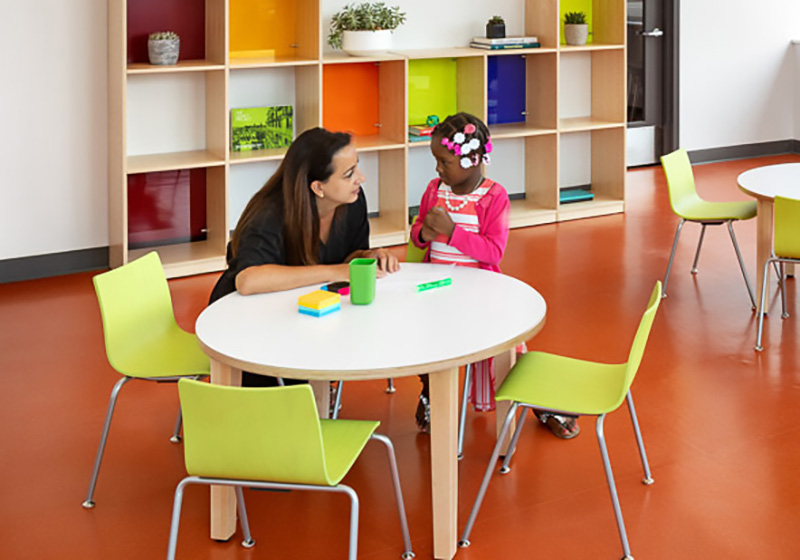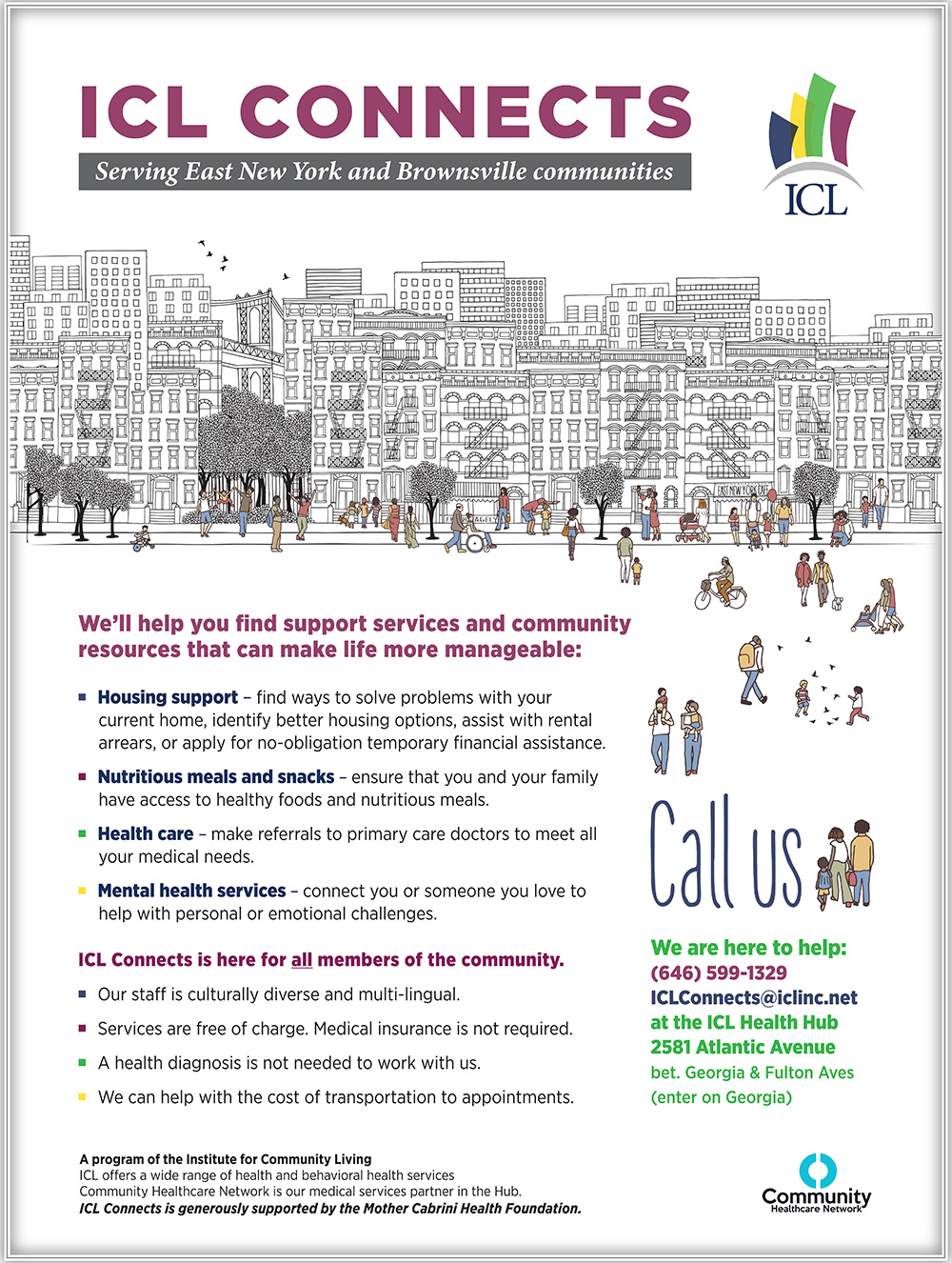We know that most if not all of the people we serve at the Institute for Community Living (ICL) have experienced multiple traumas in the course of their lives. This is true for every ICL program, whether in behavioral health clinics and crisis services or housing for people living with mental illness and substance use or transitional shelters for almost 1,000 people experiencing homelessness.

Working with children at the ICL East New York Health Hub
This article focuses on the use of trauma-informed care in treating children with serious mental health challenges who have lived through difficult social and emotional episodes throughout much of their lives. The combination of these factors impacts a child for the rest of their lives.
So how do we use trauma-responsive care and interventions with children, particularly in times of crisis and distress? We’re looking here at two programs – the Family Resource Center (FRC) which uses a peer advocacy model and Livonia Residence which houses older youth and young adults who have lived in institutional care most of their lives and are working toward a more independent life.
Starting more than a decade ago, ICL incorporated trauma-informed care into all of its programs and services for children, youth and adults. We did so because we understood that a person’s health and mental health are deeply affected by the complexity of their life experiences and those of generations before them. People we serve at ICL generally come from communities where poverty and lack of proper health care, nutritious food and adequate education (Social Determinants of Health) have led to serious, sometimes seemingly irreversible problems. Everything we do is aimed at trying to minimize the damage done and help people move toward a more fulfilling and healthy life.
What we see every day is the extent to which lives can be turned around through the use of trauma-informed care; that experience motivates us every day, no more so than in our work with children.
Whether participating in a clinical or housing program, our work starts with understanding what brought a family – and a child – to this point in their lives and addresses the combination of psychological, behavioral and educational factors we are able to uncover.
Generations of Struggles
“ACEs”—Adverse Childhood Experiences – help to explain much of the reason a child or a family can benefit from trauma-informed care. These “adverse” experiences include physical, emotional, or sexual abuse and neglect, and household violence, as well as institutional or societal level of “abuse,” such as racism or community violence, which contribute to serious and complex stress.
A trauma-responsive approach provides us with a range of interventions and supports for children living with “adverse experiences.” The most effective way we can help children feel and do better is to reduce the sources of stress that so many of the families we work with are facing. This includes connecting them to resources that can help them meet basic needs – improved housing conditions, access to healthy food, educational support. At ICL, a whole health, whole-person approach to care also core to everything we do. Our focus on the physical health of families goes a long way in allowing them to address the emotional and mental health challenges their children may be facing.
When a child lives with multiple ACEs over time—particularly when they do not have supportive relationships with adults who provide protection—these experiences repeated over and over can lead to an extreme and long-lasting stress response. Over time the repetition can do great damage to one’s health, resulting in physical problems (heart disease), social problems (poor academic achievement) and serious mental illness or substance abuse.
While trauma in children can have many causes, we commonly see it occur around loss, often unaddressed or untreated, whatever the cause of death may have been. Mary (not her real name), nine years old, came to ICL after she lost her mother to illness and had to relocate with her family to a new city, leaving close friends and other family behind. Helping Mary began with building rapport and trust with her and her family including acknowledging the way personal values and beliefs affect the way we provide care and how families do or don’t accept care.
Mary worked with ICL’s Family Resource Center which provides trauma-informed family support services to help caregivers meet the complex needs of children, adolescents and youth. These children have been identified as having emotional, behavioral, or mental health challenges affected by biological, psychological, or social factors, most often related to trauma.
Peer advocacy is key to FRC’s support of caregivers and is also a critical part of our work with youth: Youth advocates are particularly effective working with peers who are living with the same kinds of serious mental health and emotional challenges they have faced. This sense of connection is so important in making trauma-informed care effective.
Mary’s loss of a parent caused significant emotional and mental stressors. Leaving a comfortable and safe community of family and friends exacerbated these problems. When she first came to FRC, Mary struggled to open up and share her feelings. This led to isolation and withdrawal, which Mary’s family feared would prevent her from managing her emotions and be able to cope with everyday demands like school and relationships with peers. Untreated trauma can make building healthy relationships with others difficult if not impossible.
When we met Mary, she had extremely low self-esteem and difficulty with social skills. All that she was going through was exacerbated by having to live with the pandemic. She told us how difficult it was not to be able to see friends because of COVID-19. This forced isolation reduced the already limited emotional sharing Mary had been doing and made her feel even sadder. The family was concerned Mary’s situation would only get worse as the pandemic wore on.
Mary has made incredible strides in improving her mental health thanks to her being part of FRC programs, most importantly as a participant in youth support group and meeting regularly with her youth advocate and attending sessions with a trauma-informed therapist individually and with her family. Her family has shared that Mary’s work with her therapist on her emotional regulation has been a huge part of her recovery. Her work with her youth advocate and peers have had a very positive impact on Mary’s mental health and sense of well-being.
Today Mary talks about her love of art and music. She hopes one day to be a music therapist so that she can help other children who have struggled with so many difficulties in their young lives.
Addressing the Unique Challenges for Youth
Livonia is a residential setting that works with Transition Age Youth (TAY) 18 to 24 years old. We work to support their journey toward mental health recovery as well as build on their ability to live independently and successfully in the community. Like all other ICL programs, Livonia is grounded in a trauma-informed care, recognizing the population there as highly vulnerable and will benefit from an empirically supported approach that leads to safe and effective recovery.
Diana (not her real name) currently resides at Livonia. Diana has a long history of trauma and adverse experiences involving physical and emotional abuse and struggles with depression and bouts of self-harm and suicidal ideation. She has struggled with anger and believed she would never be able to control her impulses and urges. Diana often felt that “no one understood” what she was going through and how she was feeling.
Since working closely with her case manager at Livonia, as well as a youth advocate at the FRC, Diana says she is better able to connect with her peers and feels a greater sense of being heard and understood. She has reported that this is the first time that she has felt hopeful that she can grow and progress toward independence in the community.
Reducing a Lifetime of Stressors
For children whose lives have been seriously compromised by adverse life experiences, we see at both FRC and Livonia how the support of a mental health team as well as a peer advocate can have a very positive impact. Another way we approach children whose lives have been marked by trauma is to teach self-care activities including meditation and mindfulness, physical exercise and sports, and exposure to music and art. Pre-pandemic, an annual trip to see a holiday extravaganza at Madison Square Garden was something that parents, caregivers and kids alike loved to take part in. A break from the stress in their lives means a lot to those who participate and represents an indirect way to treat the effects of trauma.
Connecting families to other forms of trauma-informed care support for their children include making referrals to things like occupational, speech and language therapy, family therapy and less known but highly effective tools in trauma treatment such as Eye Movement Desensitization and Reprocessing Movement (EMDR), use of music and other forms of artistic and creative expression, and even animal-assisted therapies.
At FRC, we have built a large referral network of community supports who also recognize the importance of trauma-informed care. Brooklyn Creative Arts Therapy; Community Counseling and Mediation; Brooklyn Perinatal Network; and YAI are just a few of the exceptional resources we refer to regularly. Beyond connecting to vital clinical support grounded in understanding traumas our families have lived through, we work to help families build relationships with caring individuals in all parts of their lives – their family, community, and even their heritage.
While people of all ages and social strata have been affected by the pandemic, and the majority are suffering with mental health challenges as a result, the impact on children and youth has been most severe. Many believe the collective impact will last for decades. For the children and youth we serve, who had been living in a state of crisis long before COVID-19, the pandemic may have reversed years if not decades of progress for children, youth and families. But our experience with trauma-informed care has been instrumental in our ability to help many youth and families navigate the many traumas – including the pandemic—that have effected them for much their lives. We are optimistic that the damage of these negative life experiences can be turned around and allow a person – whatever age—to lead the most fulfilling life possible.
Amy E. Schmelz, MS, NCC, is Clinical and Training Support Specialist and Clinical Partner at ICL.







